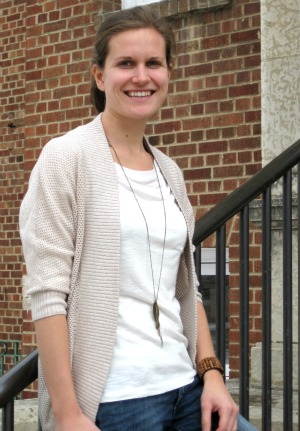
PhD student, Bethan Kingsley is doing community based research that may help families of limited means enjoy better access to recreational opportunities.
Opportunities to be physically active, would, in a perfect world, be available and accessible to everyone, no matter their circumstances. Finding ways to do this is doctoral student Bethan Kingsley's passion and the basis of her community-based research, working in a unique partnership between the University of Alberta, Alberta Recreation and Parks Association and Strathcona County Department of Recreation, Parks and Culture.
Her outstanding contributions to the project recently earned Kingsley the prestigious Louise Svarich Memorial Graduate Award. The award is presented annually to a student in a master's or PhD degree program, with an interest in applying the discipline of psychology to child development, sport or education.
"My interest and motivation come from the fact that although there is a lot of literature around the barriers that low income families have to overcome to access physical activity opportunities, little seems to actually be done to improve access and opportunities for these families," says Kingsley.
The partnership project in Alberta, with a special focus on removing barrier to physical activity, is part of a national initiative called, "Everybody Gets to Play™," which seeks to provide communities across the country with ways of increasing recreational opportunities by identifying and removing barriers to participation.
Community-based research involves a collaborative process throughout the research, starting with the design of the research project's goal and objectives, explains Kingsley. "The idea of community-based research is to collaborate in the production of research knowledge and any knowledge and outcomes generated through the research are mutually beneficial for the people involved."
Kingsley plans to talk to the practitioners and service providers who are trying to provide physical activity opportunities through the "Everybody Gets to Play™" program as well as interviewing the youth and parents of low-income families who may benefit from the initiative.
Whereas she expects barriers faced to be fairly consistent, Kingsley is interested in understanding how these barriers are experienced at a local level and what can be done about them. "There is a difference between talking about physical barriers in an abstract sense and then seeing how children are not able to come to these programs because it takes them two buses and two hours to get to and from the recreation centres for only an hour of physical activity," says Kingsley.
She is also hopeful that the knowledge generated through her research project in Strathcona County will help to engender more community-based research initiatives between the University of Alberta and other local partners. This would eventually involve providing workshops for the design and implementation of similar community-based research initiatives in other counties and rural areas throughout Alberta.
Kingsley also hopes to be able to integrate families of low-income further in the design and implementation of her research project besides conducting interviews with them, although she says it's difficult to place onerous time commitments on these families.
Kingsley says she's concerned with the use of the term 'low-income' that's freely used by researchers and policy makers to categorize some population groups, without thinking about how that term might impact people, hearing themselves described this way.
"When I am working at a local level, it feels awkward," she says. "I am very aware of the language we are using and how it makes people feel. I feel uncomfortable with it and would like to know the impact that using such labels has on the communities involved in the research process."
Kingsley says one of the most valuable lessons she's learned has been to redefine the term "successful community-based research" in more fluid terms of "doing the best one can with one's available resources and within the constraints of the research project, while being able to adapt on the ground to a constantly shifting and dynamic research context."